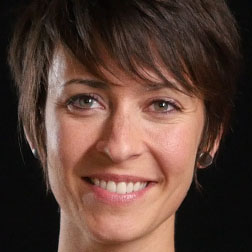Last night I learned something I didn’t expect to learn about leadership from watching The Lost World: Jurassic Park.
This lesson comes from an old adage: “Never bring home an injured baby Tyrannosaurus Rex.”
First, replay this gripping scene in your mind’s eye:
It was a dark and stormy night. Scientist Julianne Moore warned activist Vince Vaughn, injured T-Rex in his arms, saying that taking the injured dinosaur to their trailer laboratory was “going to be really, really bad.” Even if you don’t remember this scene, you’ve already guessed (1) he didn’t listen, and (2) it was really, really bad. (Raging Ma and Pa Rex pushed the lab over the 500 foot cliff into the churning sea below. And, worse yet, I don’t think Vince Vaughn ever apologized.)
What’s this got to do with leadership and collaboration, you ask?
Well, I find it curious that similarly in our groups at work, timely knowledge (like that of the savvy scientist) can sometimes go unheard.
In decision-making processes, when there is a high value placed on inclusion, the unintended effect is sometimes that the most pertinent or relevant knowledge is suppressed or ignored. Frequently, this is in favor of the pursuit of “feel-good” balanced participation and consensus (whether it’s informed, or not). For a group, the consequences can be dire, or at a minimum, unproductive and stagnating.
The reason why the relative value of these different inputs goes unexamined is because we may be subtly (or perhaps unconsciously) favoring fully-expressed subjectivity over empirical sensibility. We avoid evaluating the idea in favor of maintaining happy campers.
Now I’ll also be the first to admit that the opposite is often true: a special expertise is privileged early on and pulls people into action without sufficient alignment, so the resulting group’s action is uncoordinated and ineffective.
Both of these biases fail our higher aims as collaborators, makers, entre- and intrapreneurs, leaders and facilitators. And what they are failing is not merely our aspiration for a “successful” outcome. They fail because they betray the reality of what is arising now in order to stick to an existing commitment we’ve made to ourselves about what should be.
The challenge is that we make these commitments—large and small—all the time. And the danger is that if we don’t realize we’re making them, these commitments are actually “making us”—and not the other way around.
As a leader, mentor, coach or facilitator, my commitment is too small if it remains within the safe contours of a preferred outcome or a political status quo. Especially when I am faced in the moment with unexpected information.
If I want to authentically and adaptively serve those I am working with, my first commitment must be to my own responsiveness; to those around me, to the novelty of the moment, to creativity, and to the wisdom inherent in conflict, power and intense emotion.
As a facilitator, I need to be just as sensitive to the coherence and alignment of the group and the group’s shared meaning and understanding, as I am to the speed and tempo of the decision-making process.
Both the subjective and objective perspectives available to all of us need to inform important decisions and joint actions—not only because there is a T-Rex on my butt and the stakes are high, but also because as a leader, I care about buy-in and commitment, follow-through and execution.
So a question worth asking is, “How do you enable a conversation and decision-making process that maintains forward momentum and appropriately and consciously privileges resident expertise and shared understanding?”
If we can facilitate this kind of flex-flow experience, we can up-level the participation and performance of any group we might be working with.
Here are some suggestions for those of us who’ve chosen to step into roles where (explicitly or implicitly) we are exerting our influence for the beneficial development of those around us:
- Empty out and get the pressure of the T Rex off your back. Get friendly with not-knowing. invite play. Reconnect yourself to this moment, right now. And Now. And NOW…
- When you’re in the middle of the fray, scan your own awareness and intention. What is driving you? What is being called for? What sensations do you notice in your body?
- Do the same with the group, ask “What is our intention?” Get grounded and check for alignment before you attempt to solve anything.
- Align your responsiveness first and foremost with the group’s intention and context. Be willing to serve it transparently and take risks in order to do so.
- Align the energy behind your response with the situation. You may need to cut through, or you may need to drop back and become more receptive. Regardless, our responses should never be automatic; that way, they become reactions.
- Seek out diverse rather than uniform participation, and don’t be afraid to call for authentic individual contributions to the group process.
- Ask the group what knowledge or content expertise will be of assistance with this intention.
- Take a meta-perspective on the group’s culture and be willing to point it out. Your invitation might be challenging, but by reflecting back, you’re offering an opportunity for everyone to get a higher vantage point on the system that’s being created.
P.S. One last lesson: Keep out of the tall grass unless you can outrun a velociraptor (you can’t).
Rebecca Colwell
CEO, Ten Directions
Program Director, Integral Facilitator




5 thoughts on “What does Adaptive Leadership have to do with avoiding a T-Rex?”
Thanks for the article. Kantor’s Structural Dynamics comes to mind for me; i.e. strong movers with some loyal followers drown out opposers and bystanders in unskilled team/group discussions…
Thanks very much Conroy.. I agree that Kantors’ model is helpful for anticipating some overt group dynamics.. We have a growing capacity to understand similar dynamics within our self, and an important learning edge for facilitative leaders is to use that knowledge and also turn our awareness inward so we can interact with those dynamics in a more conscious and responsive way.
So much wisdom in this post Becky and wonderfully practical practices. This is a huge cultural challenge for many leaders. I notice the difference in challenge when I’m a facilitator in a culture of this nature and when I’m a leader IN a culture of this nature.
Thanks for your comments Jane. Can you say more about the “differences in challenge” based on roles? I’d love to hear your thoughts on this. For example, have you experienced role-determined limitations, or found you can take different perspectives as a facilitator?
I am reminded of the explosion of the Challenger shuttle. There is clear and poignant records of the knowledgeable materials engineers at Morton Thiokol being told to “take off your engineering hat and put on your management hat”. The leadership challenge is how to promote deeper understanding rather than brokering sgrrement. It becomes emperiled when there is sponsoring funding with performance bonuses tied to goals rather than achievements.